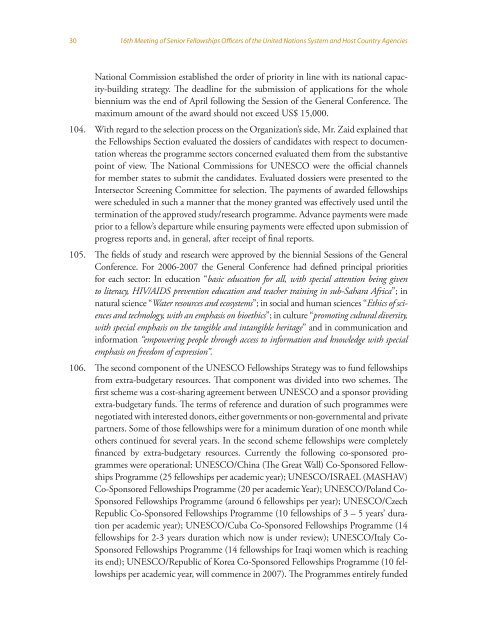16th Meeting of Senior Fellowships Officers of the ... - Development
16th Meeting of Senior Fellowships Officers of the ... - Development
16th Meeting of Senior Fellowships Officers of the ... - Development
Create successful ePaper yourself
Turn your PDF publications into a flip-book with our unique Google optimized e-Paper software.
30<br />
<strong>16th</strong> <strong>Meeting</strong> <strong>of</strong> <strong>Senior</strong> <strong>Fellowships</strong> <strong>Officers</strong> <strong>of</strong> <strong>the</strong> United Nations System and Host Country Agencies<br />
National Commission established <strong>the</strong> order <strong>of</strong> priority in line with its national capacity-building<br />
strategy. The deadline for <strong>the</strong> submission <strong>of</strong> applications for <strong>the</strong> whole<br />
biennium was <strong>the</strong> end <strong>of</strong> April following <strong>the</strong> Session <strong>of</strong> <strong>the</strong> General Conference. The<br />
maximum amount <strong>of</strong> <strong>the</strong> award should not exceed US$ 15,000.<br />
104. With regard to <strong>the</strong> selection process on <strong>the</strong> Organization’s side, Mr. Zaid explained that<br />
<strong>the</strong> <strong>Fellowships</strong> Section evaluated <strong>the</strong> dossiers <strong>of</strong> candidates with respect to documentation<br />
whereas <strong>the</strong> programme sectors concerned evaluated <strong>the</strong>m from <strong>the</strong> substantive<br />
point <strong>of</strong> view. The National Commissions for UNESCO were <strong>the</strong> <strong>of</strong>ficial channels<br />
for member states to submit <strong>the</strong> candidates. Evaluated dossiers were presented to <strong>the</strong><br />
Intersector Screening Committee for selection. The payments <strong>of</strong> awarded fellowships<br />
were scheduled in such a manner that <strong>the</strong> money granted was effectively used until <strong>the</strong><br />
termination <strong>of</strong> <strong>the</strong> approved study/research programme. Advance payments were made<br />
prior to a fellow’s departure while ensuring payments were effected upon submission <strong>of</strong><br />
progress reports and, in general, after receipt <strong>of</strong> final reports.<br />
105. The fields <strong>of</strong> study and research were approved by <strong>the</strong> biennial Sessions <strong>of</strong> <strong>the</strong> General<br />
Conference. For 2006-2007 <strong>the</strong> General Conference had defined principal priorities<br />
for each sector: In education “basic education for all, with special attention being given<br />
to literacy, HIV/AIDS prevention education and teacher training in sub-Sahara Africa”; in<br />
natural science “Water resources and ecosystems”; in social and human sciences “Ethics <strong>of</strong> sciences<br />
and technology, with an emphasis on bioethics”; in culture “promoting cultural diversity,<br />
with special emphasis on <strong>the</strong> tangible and intangible heritage” and in communication and<br />
information “empowering people through access to information and knowledge with special<br />
emphasis on freedom <strong>of</strong> expression”.<br />
106. The second component <strong>of</strong> <strong>the</strong> UNESCO <strong>Fellowships</strong> Strategy was to fund fellowships<br />
from extra-budgetary resources. That component was divided into two schemes. The<br />
first scheme was a cost-sharing agreement between UNESCO and a sponsor providing<br />
extra-budgetary funds. The terms <strong>of</strong> reference and duration <strong>of</strong> such programmes were<br />
negotiated with interested donors, ei<strong>the</strong>r governments or non-governmental and private<br />
partners. Some <strong>of</strong> those fellowships were for a minimum duration <strong>of</strong> one month while<br />
o<strong>the</strong>rs continued for several years. In <strong>the</strong> second scheme fellowships were completely<br />
financed by extra-budgetary resources. Currently <strong>the</strong> following co-sponsored programmes<br />
were operational: UNESCO/China (The Great Wall) Co-Sponsored <strong>Fellowships</strong><br />
Programme (25 fellowships per academic year); UNESCO/ISRAEL (MASHAV)<br />
Co-Sponsored <strong>Fellowships</strong> Programme (20 per academic Year); UNESCO/Poland Co-<br />
Sponsored <strong>Fellowships</strong> Programme (around 6 fellowships per year); UNESCO/Czech<br />
Republic Co-Sponsored <strong>Fellowships</strong> Programme (10 fellowships <strong>of</strong> 3 – 5 years’ duration<br />
per academic year); UNESCO/Cuba Co-Sponsored <strong>Fellowships</strong> Programme (14<br />
fellowships for 2-3 years duration which now is under review); UNESCO/Italy Co-<br />
Sponsored <strong>Fellowships</strong> Programme (14 fellowships for Iraqi women which is reaching<br />
its end); UNESCO/Republic <strong>of</strong> Korea Co-Sponsored <strong>Fellowships</strong> Programme (10 fellowships<br />
per academic year, will commence in 2007). The Programmes entirely funded

















